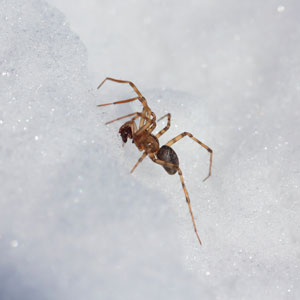What Happens to Insects in the Winter?
By Chris Williams on November 15, 2013.
 There’s no one answer to what happens to insects in the winter. In more temperate parts of the country, like Florida, insects remain mostly active year round. As long as they still have food and warmth, they keep on keeping on.
There’s no one answer to what happens to insects in the winter. In more temperate parts of the country, like Florida, insects remain mostly active year round. As long as they still have food and warmth, they keep on keeping on.
1) Some Pass the Torch to the Next Generation
For many adult insects, fall weather means the beginning of the end. They will die in late fall but will leave behind either eggs to hatch in the spring or young in the form of nymphs or larvae that will become active in the spring. Yellowjacket wasps, for example, die in the fall except for a few females from a colony that are destined to be next year’s queens. These few will overwinter and start new colonies.
2) Some Sleep Through the Winter and Live to Chirp Again
In cold regions, many insects live through the winter in a sort of hibernation state, the correct term is “diapause.” Virtually all outdoor insects in our region slow down and become inactive in the winter. It’s quite amazing that insects can survive the ice and snow and frigid temperatures of a New England winter without any harm. Insects are cold-blooded which means that their body temperature will be basically the same as the temperature of their environment. Unlike us, they can’t keep their bodies warm when it’s cold outside. As their bodies get colder, their metabolism slows down, but thanks to a sort of internal antifreeze, they don’t freeze solid. When the weather warms up in spring, they warm up and become active again.
The insects that live through the winter often belong to those groups that have two or three generations a year. The insects destined to spend the winter often hatched out only a month or two earlier and have not yet reproduced. That will be their first task come spring and they will usually die during that summer, leaving their young to find shelter the following winter.
3) Some Spend the Winter Right Under Our Noses
You’ve seen a lot of chat on this website about “overwintering insects,” those pests that do live through the winter but that like to try to do so in our homes. In the fall, these insects know that it’s time to find a protected place to hunker down and wait for spring. Their normal overwintering sites are under tree bark, under rocks, in heavy mulch, in woodpiles, under siding – really anyplace that they will be protected from predators and heavy weather. When there are large populations of certain pests like stink bugs, lady beetles, and boxelder bugs though, some of them end up in our homes spending the winter hidden in attics and wall voids. When the weather warms up, they will try to find their way back outside without so much as a “thanks” for the lodging.
Sign up for our biweekly email newsletter for more information about bugs and pests!